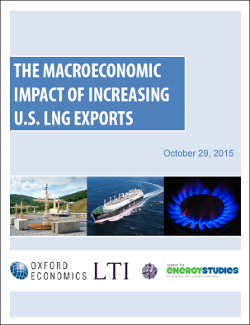Ungated Post | 04 Jan 2016
The Macroeconomic Impact of Increasing U.S. LNG Exports

Oxford Economics and The Center for Energy Studies at Rice University’s Baker Institute were commissioned by Leonardo Technologies, Inc. on behalf of the Department of Energy to undertake a scenario‐based assessment of the macroeconomic impact of alternative levels of U.S. LNG exports under a range of assumptions concerning U.S. resource endowment, U.S. gas demand, and the international market environment. The report finds that the overall macroeconomic impacts of higher LNG exports are marginally positive, a result that is robust to alternative assumptions for the U.S. natural gas market. Although some energy‐intensive, trade‐exposed industries such as cement, concrete, and glass see modest negative impacts, these are offset by the positive impacts of increased LNG production and investment by the natural gas sector.
Oxford Economics’ team is expert at applying advanced economic tools that provide valuable insights into today’s most pressing business, financial, and policy issues.
To find out more about our capabilities, contact:
Americas
Diantha Redd
+1 (646) 503 3052
Email
Asia Pacific
Peter Suomi
+65 6850 0110
Email
EMEA
Aoife Pearson
+44 (0)203 910 8054
Email
Related Services

Post
The economic impact of abandoning the WTO
Oxford Economics have been commissioned by the International Chamber of Commerce (ICC) to provide an independent assessment of the economic impact of WTO dissolution. This report details our findings and the assumptions underpinning our analysis.
Find Out More
Post
The economic impact of the sports activities of public service media
This study shows how the sports activities of public service media supported €4.5 billion of GDP and 57,000 jobs across 31 European countries in 2022, taking direct, indirect (supply chain), and induced (wage-funded expenditure) impacts into account. The report also highlights wider economic benefits of public service media sports coverage, such as the way in which it leverages sponsorship income for sports bodies.
Find Out More
Post
Global Trade Education: The role of private philanthropy
Global trade can amplify economic development and poverty alleviation. Capable leaders are required to put in place enabling conditions for trade, but currently these skills are underprovided in developing countries. For philanthropists, investing in trade leadership talent through graduate-level scholarships is an opportunity to make meaningful contributions that can multiply and sustain global economic development.
Find Out More